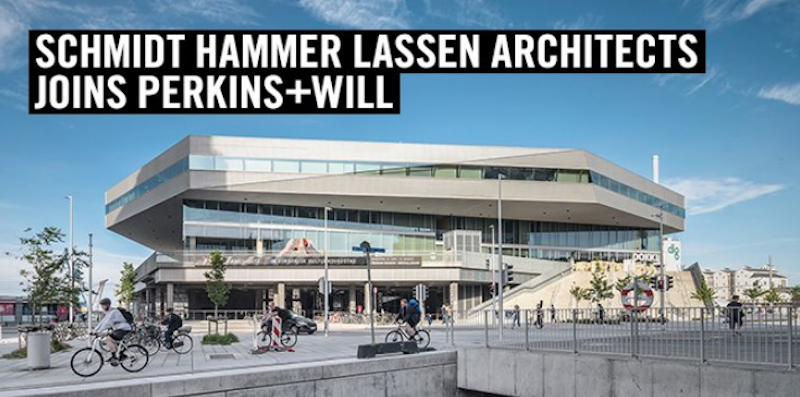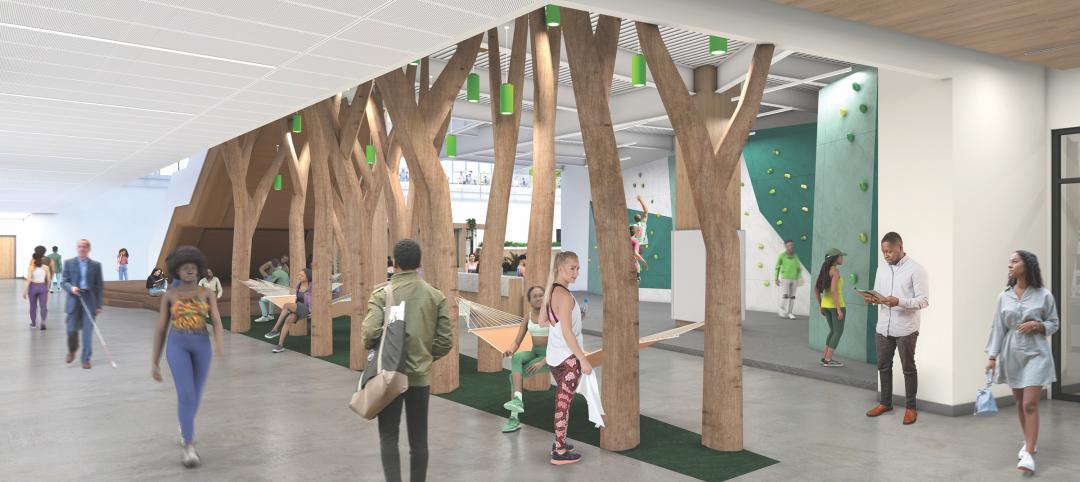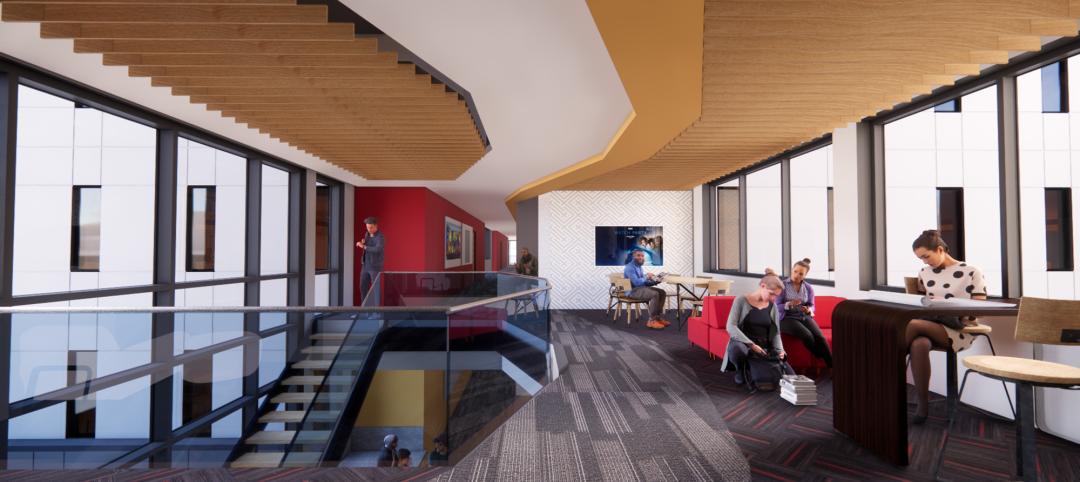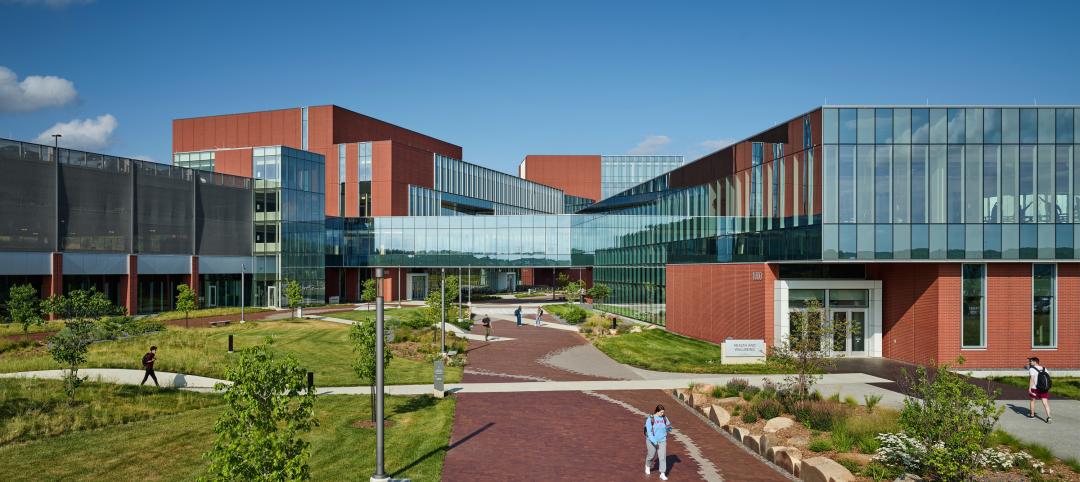One of Scandinavia’s most recognized design firms, Schmidt Hammer Lassen Architects, has joined global architecture firm Perkins+Will in a strategic partnership that extends Schmidt Hammer Lassen’s international reach and reinforces Perkins+Will’s commitment to sustainability and design excellence.
Founded in 1986, Schmidt Hammer Lassen is known around the world for its iconic, highly sustainable cultural and civic architecture, including The Black Diamond, the extension to the Royal Library in Copenhagen; ARoS Museum of Art in Aarhus, Denmark’s second-largest city; Halifax Central Library in Nova Scotia, Canada; the Katuaq Cultural Centre in Nuuk, Greenland; and the International Criminal Court in The Hague. The firm recently won a global competition to design the world’s largest library—the 1.2 million-square-foot Shanghai East Library—and it is currently working on the transformative Monroe Blocks mixed-use development in Detroit, Michigan, the firm’s first project in the United States.
By combining Perkins+Will’s 83-year legacy of design excellence with Schmidt Hammer Lassen’s illustrious Danish design pedigree, the united firms will make even greater contributions to the canon of cultural and civic architecture, according to Perkins+Will CEO Phil Harrison.
“Part of what makes this partnership so special is that Perkins+Will and Schmidt Hammer Lassen share a common set of values: design excellence, sustainability, innovation, and the highest level of client service,” Harrison says. “We also maintain the same design ethos, believing that exceptional architecture is always democratic and in the service of the greater good. We’re compatible at every level.”
Bjarne Hammer, founding partner of Schmidt Hammer Lassen, agrees:
“Our firms share a clear mission: through architecture and design, we make a positive difference in the world and in the lives of others. We both believe strongly in the transformative, healing power of design to address some of the most pressing social and environmental issues of our time. And, we both thrive in a design culture that encourages collaboration.”
Complementary Goals
In addition to a shared vision and purpose, the two firms have symbiotic market strategies. Perkins+Will aims to diversify its global talent, expand its cultural and civic practice, and reinforce the caliber of its design portfolio. At the same time, Schmidt Hammer Lassen aims to expand into new geographic markets, grow its client base, and apply groundbreaking design research to practice.
“We want to be known as a company that is both design-driven and client-focused, as a firm that produces extraordinary designs and delivers them with extraordinary efficiency. Merging with Perkins+Will enables us to maintain this critical part of our identity while having the support, technology, and reach of a much larger organization,” says Schmidt Hammer Lassen CEO Bente Damgaard. “It’s a fantastic opportunity.”
Perkins+Will’s global platform also provides a host of benefits to Schmidt Hammer Lassen’s international clients, Damgaard says, because they now have all of the resources, talent, and expertise—including research—they need within a single firm. This streamlines collaboration, facilitates communication, and ensures smooth project delivery.
Aligned In Design
The union of Perkins+Will and Schmidt Hammer Lassen is supported in large part by both firms’ legacies of, and commitments to, design excellence.
Over the last eight decades, Perkins+Will’s landmark projects of beautiful, thoughtful design—like the transformative Rush University Medical Center in Chicago, Illinois; the Shanghai Natural History Museum in China; and the Albion Library in Toronto, Canada—have characterized the essence of the firm. Similarly, Schmidt Hammer Lassen’s portfolio of award-winning architecture—projects that constitute works of public art in and of themselves—underscores the firm’s 32-year history of distinguished design. Examples of built work include Dokk1, the largest public library in Scandinavia; Malmö Live, a concert, congress, and hotel complex in Sweden; and Vendsyssel Theatre in Denmark, a music and theater hall that celebrates cultural exchange.
“Our firm is unequivocally rooted in Scandinavian architectural traditions, which are based on values like democracy, welfare, sustainability, light, openness, and social responsibility,” says Kristian Lars Ahlmark, senior partner at Schmidt Hammer Lassen. “Our buildings not only reflect these values, but they also impart these values on all who encounter them, whether tenants, visitors, or passersby.”
Synergies in Sustainability
Additionally, both Schmidt Hammer Lassen and Perkins+Will are known leaders in sustainability. Through their high-performing, environmentally responsive designs, the firms contribute significantly to the reduction of greenhouse gas emissions that cause climate change, and to the improvement of human and ecological health. The firms have designed hundreds of projects—collectively amounting to several hundred million square feet—that meet or surpass various international standards for green building. And their staff include many of the industry’s most sought-after experts in sustainable design.
“Sustainability is in our DNA at both Perkins+Will and Schmidt Hammer Lassen,” says Damgaard. “It’s just another example of the synergy between our firms—and of why this partnership makes sense.”
Cultural Diversity
The partnership is also a celebration of differences in culture, customs, language, and heritage—and of the design innovation that occurs when those differences interplay.
“Both of our firms believe in the global diversification of talent and creativity,” says Harrison. “We see the coming together of design cultures, aesthetics, and sensibilities as a positive force that leads to better, more thoughtful, more inclusive architecture. At Perkins+Will, we appreciate and celebrate Schmidt Hammer Lassen’s Danish design legacy, and look forward to the many ways it will positively influence our collective body of work.”
Related Stories
Construction Costs | Oct 16, 2024
Construction Crane Index: Most major markets’ crane counts increase or hold steady in third quarter
Rider Levett Bucknall’s (RLB’s) latest Crane Index and Quarterly Cost Report shows continued decreasing cost inflation and crane counts increasing or holding steady in 10 of the 14 major markets it surveyed. The national average increase in construction costs was 1.07%, the lowest it’s been in the last three years.
AEC Tech | Oct 16, 2024
How AI can augment the design visualization process
Blog author Tim Beecken, AIA, uses the design of an airport as a case-study for AI’s potential in design visualizations.
University Buildings | Oct 15, 2024
Recreation and wellness are bedfellows in new campus student centers
Student demands for amenities and services that address their emotional and mental wellbeing are impacting new development on college campuses that has led to recreation centers with wellness portfolios.
Higher Education | Oct 14, 2024
Higher education design for the first-gen college student
In this Design Collaborative blog, Yogen Solanki, Assoc. AIA, shares how architecture and design can help higher education institutions address some of the challenges faced by first-generation students.
Performing Arts Centers | Oct 10, 2024
Studio Gang's performing arts center for Hudson Valley Shakespeare breaks ground
A new permanent home for Hudson Valley Shakespeare, a professional non-profit theater company, recently broke ground in Garrison, N.Y. The Samuel H. Scripps Theater Center includes a 14,850 sf performance venue that will serve as a permanent home for the theater company known for its sweeping open-air productions of classics and new works.
Sustainable Design and Construction | Oct 10, 2024
Northglenn, a Denver suburb, opens a net zero, all-electric city hall with a mass timber structure
Northglenn, Colo., a Denver suburb, has opened the new Northglenn City Hall—a net zero, fully electric building with a mass timber structure. The 32,600-sf, $33.7 million building houses 60 city staffers. Designed by Anderson Mason Dale Architects, Northglenn City Hall is set to become the first municipal building in Colorado, and one of the first in the country, to achieve the Core certification: a green building rating system overseen by the International Living Future Institute.
3D Printing | Oct 9, 2024
3D-printed construction milestones take shape in Tennessee and Texas
Two notable 3D-printed projects mark milestones in the new construction technique of “printing” structures with specialized concrete. In Athens, Tennessee, Walmart hired Alquist 3D to build a 20-foot-high store expansion, one of the largest freestanding 3D-printed commercial concrete structures in the U.S. In Marfa, Texas, the world’s first 3D-printed hotel is under construction at an existing hotel and campground site.
University Buildings | Oct 9, 2024
Des Moines University Medicine and Health Sciences opens a new 88-acre campus
Des Moines University Medicine and Health Sciences has opened a new campus spanning 88 acres, over three times larger than its previous location. Designed by RDG Planning & Design and built by Turner Construction, the $260 million campus features technology-rich, flexible educational spaces that promote innovative teaching methods, expand research activity, and enhance clinical services. The campus includes four buildings connected with elevated pathways and totaling 382,000 sf.
Student Housing | Oct 9, 2024
University of Maryland begins work on $148 million graduate student housing development
The University of Maryland, in partnership with Campus Apartments and Mosaic Development Partners, has broken ground on a $148.75 million graduate student housing project on the university’s flagship College Park campus. The project will add 741 beds in 465 fully furnished apartments.
Healthcare Facilities | Oct 9, 2024
How healthcare operations inform design
Amanda Fisher, Communications Specialist, shares how BWBR's personalized approach and specialized experience can make a meaningful impact to healthcare facilities.

















